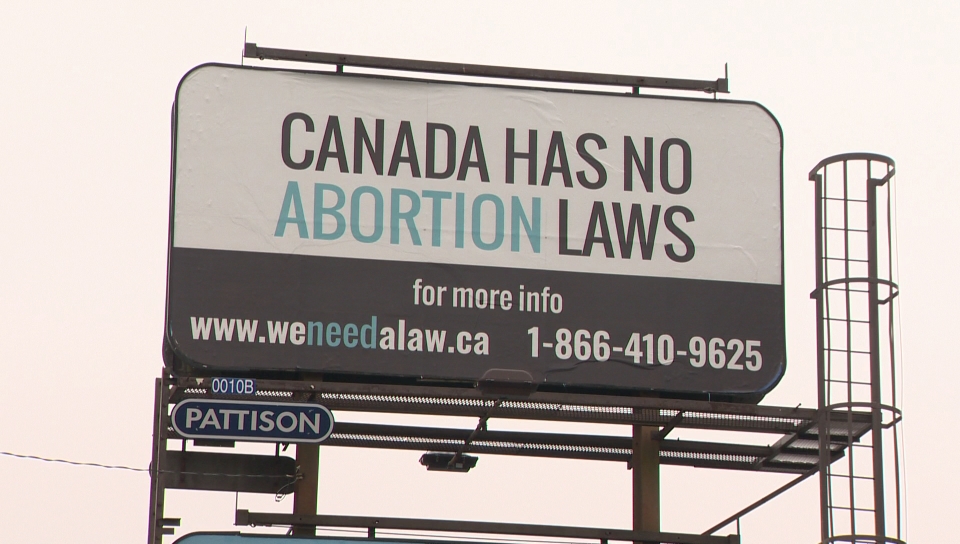How abortion rights work in Canada — and whether they could be put at risk
Abortion in Canada is unlikely to face the legal threats it is facing in the United States, but experts say there are still ways the right can be undermined.
Several states are facing international criticism over legislation that moved to limit abortions. The new laws will almost definitely be blocked while legal challenges play out. The U.S. Supreme Court’s landmark decision in Roe v. Wade said a woman has the right to choose whether to have an abortion.
Jessica Shaw, an assistant professor with the University of Calgary’s faculty of social work, says Canada’s approach to abortion is different from those south of the border.
“There are lots of differences between the two countries, but one of them is how abortion is taken up by politicians and the media,” Shaw explained. “Canada has a strong history since 1988 of shutting any attempt to reopen the abortion debate in Parliament.”
She noted it’s often the opposite in the U.S., where abortion is “consistently discussed and reintroduced and debated.”
But abortion rules are still the source of significant debate in Canada. Here’s a look how abortion rules were formed in Canada — and whether they could ever face a challenge like the one in the U.S.
Why Canada doesn’t have an abortion law
Abortion — in some circumstances — was decriminalized in Canada under the Pierre Trudeau government in 1969, but it had to be approved by “therapeutic abortion committee.”
Rachael Johnstone, a postdoctoral fellow at The Balsillie School of International Affairs who studies abortion rights, explained that access to these committees was very difficult for women, especially outside cities.
It wasn’t until the 1988 ruling in the R v. Morgentaler case that the Supreme Court of Canada said that abortion law violated Section 7 of the Charter of Rights and Freedoms.
“That decision struck down Section 251 of the Criminal Code and we got rid of therapeutic abortion committees,” Johnstone explained.
Johnstone said that parliament tried to create a law to reflect the Supreme Court decision, but was never successful because the debate was so polarizing.
“It was very difficult for them to try to get anyone to agree because those who were in favour of improving abortion access did not want restrictions, then there were those who wanted to recriminalize it.”
Could provinces do what U.S. states are doing?
After the 1988 decision, abortion was treated like any other medical procedure without a law governing it — and therefore it’s now up to provinces to regulate access.
“It’s one of the reasons why we can still say we have something of a patchwork access to abortion in Canada,” Johnstone noted, explaining some provinces have more access than others. Access also varies based on whether women live closer to cities or in rural areas.
“Since 1988, there have been many provincial court cases that have significantly changed the landscape of access,” she said.
However, Johnstone explained that because in Canada criminal law is federal jurisdiction, provinces don’t have the same abilities that U.S. states do.
“The provinces can’t act in the way that states are acting, because power is divided up differently,” Johnstone said.
She noted that in the past, provinces have “tried to effectively recriminalize abortion by blocking access. Rather than going a strictly legal route to restricting access, they’ve tried to change the regulation threshold.”
While the abortion debate is largely left aside by both federal and provincial leaders, it does reappear once in a while.
Earlier this month, for example, Ontario MPP Sam Oosterhoff told a group of anti-abortion protesters, “We have survived 50 years of abortion in Canada and we pledge to fight to make abortion unthinkable in our lifetime.”
Ontario Premier Doug Ford released a statement later that day saying his government would not reopen the debate over abortion, and despite being asked repeatedly about Oosterhoff’s comments, he has not addressed them.
Some provinces have also taken steps to protect abortion rights and make it more easily accessible. Most recently in June 2018, Alberta passed the “Protecting Choice for Women in Accessing Health Care Act.”
Do we need a law?
The debate over whether Canada needs an actual law solidifying abortion has two schools of thought among the pro-choice community, Shaw explained.
Several advocacy groups have argued for years that Canada needs an abortion law.
“Those who argue for an abortion law would like to see abortion protected in the same way that we affirm sexual orientation, the same way that we affirm gender identity now saying that discrimination based on gender is inappropriate,” Shaw said.
On the other hand, some say it’s better to leave abortion rules in Canada as they are.
“On the same spectrum, but on the other side, there are folks who say the absence of any law keeps it from being something that can be attacked legally,” she added.
Source: Read Full Article





